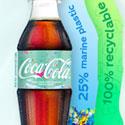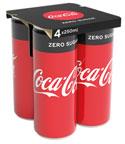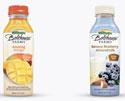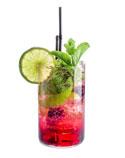Coca-Cola
Honest Tea Co-Founder Seth Goldman To Move On At The End of 2019
Sweden Will Be First Coca-Cola Market To Adopt Fully Recycled Plastic Bottles
 Coca-Cola and Coca-Cola European Partners (CCEP) announced that Sweden will be the first market where all Coke products will be packaged in fully recycled plastic bottles. The transition beginning in the first quarter of 2020, will cut the use of new plastic by 3,500 tons annually. Plastic packaging for 40 types of products, including Sprite and Bonaqua, will consist entirely of recycled material next year, except for caps and labels. Coca-Cola was recently named the top global plastic polluter in a worldwide audit of 476,000 pieces of waste organized by Greenpeace. In Western Europe, however, Coke is two years ahead of schedule to reach a goal that at least 50 percent of its plastic packaging to consist of recycled material by 2025.[Image Credit: © Coca-Cola European Partners.]
Coca-Cola and Coca-Cola European Partners (CCEP) announced that Sweden will be the first market where all Coke products will be packaged in fully recycled plastic bottles. The transition beginning in the first quarter of 2020, will cut the use of new plastic by 3,500 tons annually. Plastic packaging for 40 types of products, including Sprite and Bonaqua, will consist entirely of recycled material next year, except for caps and labels. Coca-Cola was recently named the top global plastic polluter in a worldwide audit of 476,000 pieces of waste organized by Greenpeace. In Western Europe, however, Coke is two years ahead of schedule to reach a goal that at least 50 percent of its plastic packaging to consist of recycled material by 2025.[Image Credit: © Coca-Cola European Partners.]
Coca-Cola Adopts New Multipack Packaging Technology In Europe
 Coca-Cola and bottling partners Coca‑Cola HBC and Coca‑Cola European Partners announced they will begin to introduce a new multipack can packaging solution called KeelClip across Europe. The sustainability and merchandising benefits of KeelClip include complete coverage of can tops to keep them clean, finger holes to allow for easy carrying, and minimization of the amount of paper required. In response to the development, Coca-Cola HBC will invest $16.6 million into the packaging solution and will remove shrink wrap from all of its can multipacks in all European Union markets by the end of 2021, saving 2,000 tons of plastic and 3,000 tons of CO2 annually. Coca-Cola HBC plans to introduce KeelClip to its products early next year beginning in Ireland and Poland, then in Austria, Italy, Switzerland, and Romania in 2020. The new packaging will be used on all can multipacks of up to eight cans; larger can multipacks will be bound by a carton pack.[Image Credit: © Coca-Cola Hellenic Bottling Company]
Coca-Cola and bottling partners Coca‑Cola HBC and Coca‑Cola European Partners announced they will begin to introduce a new multipack can packaging solution called KeelClip across Europe. The sustainability and merchandising benefits of KeelClip include complete coverage of can tops to keep them clean, finger holes to allow for easy carrying, and minimization of the amount of paper required. In response to the development, Coca-Cola HBC will invest $16.6 million into the packaging solution and will remove shrink wrap from all of its can multipacks in all European Union markets by the end of 2021, saving 2,000 tons of plastic and 3,000 tons of CO2 annually. Coca-Cola HBC plans to introduce KeelClip to its products early next year beginning in Ireland and Poland, then in Austria, Italy, Switzerland, and Romania in 2020. The new packaging will be used on all can multipacks of up to eight cans; larger can multipacks will be bound by a carton pack.[Image Credit: © Coca-Cola Hellenic Bottling Company]
Nestle
Nestlé Exec Says Nescafe Azera Out-Of-Home Coffee Machines Meet Needs Of Busy Gen-Zers
 A Nestlé executive told a recent U.K. meeting of the IGD research and training charity that it has high hopes for Generation Z coffee drinkers – “ambitious young trendies” – for shaping the future of the coffee-to-go market, particularly the machine sector. Unlike older generations, Gen-Zers “are drinking coffee out of home all the time” – it has become “an absolute necessity,” Kate Alexander said. She acknowledged that the coffee-to-go market is fairly saturated, but despite that there’s room for improvement, particularly in “the machine sector.” Current coffee machines are old fashioned, but Gen-Zers are steeped in the digital age, which presents the company with an opportunity. Nestlé is offering the young generation an “enhanced, premium, personalized, and frictionless experience” via the Nescafe Azera out-of-home coffee machines. [Image Credit: © Elias Shariff Falla Mardini from Pixabay]
A Nestlé executive told a recent U.K. meeting of the IGD research and training charity that it has high hopes for Generation Z coffee drinkers – “ambitious young trendies” – for shaping the future of the coffee-to-go market, particularly the machine sector. Unlike older generations, Gen-Zers “are drinking coffee out of home all the time” – it has become “an absolute necessity,” Kate Alexander said. She acknowledged that the coffee-to-go market is fairly saturated, but despite that there’s room for improvement, particularly in “the machine sector.” Current coffee machines are old fashioned, but Gen-Zers are steeped in the digital age, which presents the company with an opportunity. Nestlé is offering the young generation an “enhanced, premium, personalized, and frictionless experience” via the Nescafe Azera out-of-home coffee machines. [Image Credit: © Elias Shariff Falla Mardini from Pixabay]
Other Companies
Former Bolthouse Farms CEO Is Rebuilding The Company After Campbell Soup Calamity
 Seven years after refrigerated juice maker Bolthouse Farms was sold to Campbell Soup – it was divested this year after bleeding red ink for several years – former CEO Jeff Dunn is back at the helm after Butterfly Equity acquired Bolthouse at auction. It is now planning to launch 25 new products next spring, including brand-new items and line extensions of existing offerings. The company is targeting the U.S. keto diet craze with low-sugar, low-carb RTD protein beverages and functional shots with ingredients to help immunity, digestion, energy, wellness, and metabolism. The brand will also try to innovate carrots in the same way that cauliflower has been revitalized. The company is also moving into the CBD space with two ready-to-drink beverage lines – under a different brand name – that contain CBD, including a low-sugar, low-calorie functional beverage, and a coffee option, expected to launch in California next year. Dunn also plans to purchase existing brands via mergers and acquisitions. [Image Credit: © Bolthouse Farms, Inc.]
Seven years after refrigerated juice maker Bolthouse Farms was sold to Campbell Soup – it was divested this year after bleeding red ink for several years – former CEO Jeff Dunn is back at the helm after Butterfly Equity acquired Bolthouse at auction. It is now planning to launch 25 new products next spring, including brand-new items and line extensions of existing offerings. The company is targeting the U.S. keto diet craze with low-sugar, low-carb RTD protein beverages and functional shots with ingredients to help immunity, digestion, energy, wellness, and metabolism. The brand will also try to innovate carrots in the same way that cauliflower has been revitalized. The company is also moving into the CBD space with two ready-to-drink beverage lines – under a different brand name – that contain CBD, including a low-sugar, low-calorie functional beverage, and a coffee option, expected to launch in California next year. Dunn also plans to purchase existing brands via mergers and acquisitions. [Image Credit: © Bolthouse Farms, Inc.]
Fiji Water President Leaves The Wonderful Company Under Mysterious Circumstances
Elizabeth Stephenson, president of The Wonderful Company’s Fiji Water business, has resigned, according to an email from the company. No further information is available, and no replacement has been named. The company has been distributed via its own direct-store-delivery (DSD) system since July 2018, following the discontinuation of its distribution partnership with Dr Pepper Snapple (DPS) after that company’s $18.7 billion merger with Keurig Green Mountain. Dollar sales of Fiji fell 13.7 percent year-over-year through August 11, according to data from IRI.
California’s Fernhill Beverage Completes Acquisition Of Energy Drink Brand
 Carlsbad, Calif.-based drinks company Fernhill Beverage has completed negotiations to acquire 100 percent of performance beverage company Super Buzz Energy Drink for an undisclosed sum. Super Buzz, which contains a juice-based blend of flavors and ingredients such as L-carnitine, folic acid, vitamins, ginseng, and taurine, was developed specifically for people aged between 15 and 30. It is available in a mango and passionfruit flavor in a 16-ounce aluminum can at $2.49 a can. Other variants are ready for development.[Image Credit: © GlobeNewswire, Inc.]
Carlsbad, Calif.-based drinks company Fernhill Beverage has completed negotiations to acquire 100 percent of performance beverage company Super Buzz Energy Drink for an undisclosed sum. Super Buzz, which contains a juice-based blend of flavors and ingredients such as L-carnitine, folic acid, vitamins, ginseng, and taurine, was developed specifically for people aged between 15 and 30. It is available in a mango and passionfruit flavor in a 16-ounce aluminum can at $2.49 a can. Other variants are ready for development.[Image Credit: © GlobeNewswire, Inc.]
Molson Coors Expands Into Nonalcoholic Beverages With Stake In L.A. Libations
 Hoping to re-invent itself as a total beverage company, Denver, Colo.-based Molson Coors Beverage Company has taken a minority stake in ten-year-old nonalcoholic beverage firm L.A. Libations (El Segundo, Calif.). L.A. Libations specializes in identifying next-generation emerging beverages, particularly for health-conscious consumers. The company also partners with brands to provide retail selling and in-store execution services. L.A. Libations helped Molson Coors begin to expand the Clearly Kombucha brand it (as MillerCoors) acquired in June 2018, a first signal that it was interested in the nonalcoholic beverage market. The equity investment gives Molson Coors a stake in new products launched by L.A. Libations and access to brand creation, brand building, and consulting/insights services. The multi-year deal comes as Molson Coors moves to reinvent itself as a total beverage company, dropping the MillerCoors name and combining its U.S. and Canadian units. L.A. Libations parted ways with longtime partner Coca-Cola this past summer.[Image Credit: © La libations]
Hoping to re-invent itself as a total beverage company, Denver, Colo.-based Molson Coors Beverage Company has taken a minority stake in ten-year-old nonalcoholic beverage firm L.A. Libations (El Segundo, Calif.). L.A. Libations specializes in identifying next-generation emerging beverages, particularly for health-conscious consumers. The company also partners with brands to provide retail selling and in-store execution services. L.A. Libations helped Molson Coors begin to expand the Clearly Kombucha brand it (as MillerCoors) acquired in June 2018, a first signal that it was interested in the nonalcoholic beverage market. The equity investment gives Molson Coors a stake in new products launched by L.A. Libations and access to brand creation, brand building, and consulting/insights services. The multi-year deal comes as Molson Coors moves to reinvent itself as a total beverage company, dropping the MillerCoors name and combining its U.S. and Canadian units. L.A. Libations parted ways with longtime partner Coca-Cola this past summer.[Image Credit: © La libations]
Nigerian Dairy Company Debuts Lactose-Free Milk
Yogurt Maker Chobani Expands Into Oat-Based Products
 As Greek yogurt consumption drops off, Chobani yogurt founder and CEO Hamdi Ulukaya announced that the company is moving beyond dairy products to begin selling oat-based drinks, creamers, and cultured oat blends as well as dairy-based creamers. Chobani will be competing with oat milk manufacturers such as Danone-owned Silk, Planet Oat and Swedish brand Oatly, which invented and popularized oat milk. The plant-based milk industry is growing, with the total market expected to surpass $21 billion by 2024, according to a 2019 market study. In addition to its oat products, Chobani will introduce dairy-based creamers, aiming to challenge brands such as Coffee-mate and International Delight, both of which make oil-based nondairy creamers. Chobani built an oat milk plant at its factory in Twin Falls, Idaho, this year.[Image Credit: © Chobani, LLC.]
As Greek yogurt consumption drops off, Chobani yogurt founder and CEO Hamdi Ulukaya announced that the company is moving beyond dairy products to begin selling oat-based drinks, creamers, and cultured oat blends as well as dairy-based creamers. Chobani will be competing with oat milk manufacturers such as Danone-owned Silk, Planet Oat and Swedish brand Oatly, which invented and popularized oat milk. The plant-based milk industry is growing, with the total market expected to surpass $21 billion by 2024, according to a 2019 market study. In addition to its oat products, Chobani will introduce dairy-based creamers, aiming to challenge brands such as Coffee-mate and International Delight, both of which make oil-based nondairy creamers. Chobani built an oat milk plant at its factory in Twin Falls, Idaho, this year.[Image Credit: © Chobani, LLC.]
Technomic Lists Beverage Trends For 2020
 An emphasis on health, wellness, and sustainability will continue to drive innovation in the beverage industry in 2020, according to market researcher Technomic. Consumers want more consistent healthful options and unique flavors from beverages, as well as sustainably grown and sourced ingredients. This will translate into waste reduction and creative use of new ingredients in both food and drink. Technomic says U.S. consumers are operating in a heightened sense of social responsibility led by evolving life stages. Global economic factors, political implications, and labor concerns are gaining steam, impacting consumer behaviors. Their sensibilities “are more attuned to the value equation for dining occasions ... and that’s linked directly to their choices.” Look for innovation in overlooked parts of familiar plants, like beet greens, sweet potato leaves, and avocado blossom. Meanwhile, Asian cheese tea, huitlacoche, edible insects, seaweed, tonka beans, oat-based milks will all gain momentum next year, but may not sustain long-term.[Image Credit: © Daria-Yakovleva from Pixabay]
An emphasis on health, wellness, and sustainability will continue to drive innovation in the beverage industry in 2020, according to market researcher Technomic. Consumers want more consistent healthful options and unique flavors from beverages, as well as sustainably grown and sourced ingredients. This will translate into waste reduction and creative use of new ingredients in both food and drink. Technomic says U.S. consumers are operating in a heightened sense of social responsibility led by evolving life stages. Global economic factors, political implications, and labor concerns are gaining steam, impacting consumer behaviors. Their sensibilities “are more attuned to the value equation for dining occasions ... and that’s linked directly to their choices.” Look for innovation in overlooked parts of familiar plants, like beet greens, sweet potato leaves, and avocado blossom. Meanwhile, Asian cheese tea, huitlacoche, edible insects, seaweed, tonka beans, oat-based milks will all gain momentum next year, but may not sustain long-term.[Image Credit: © Daria-Yakovleva from Pixabay]
Copyright 2026 Business360, Inc.

